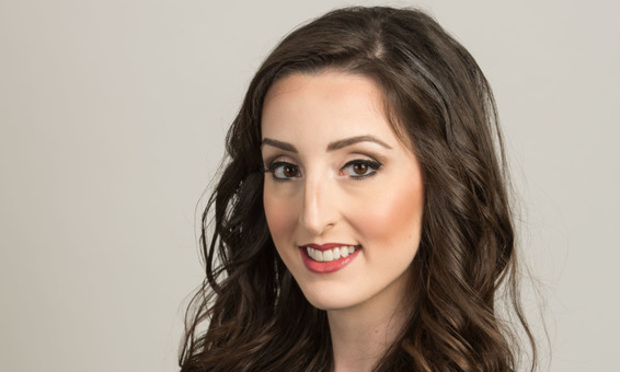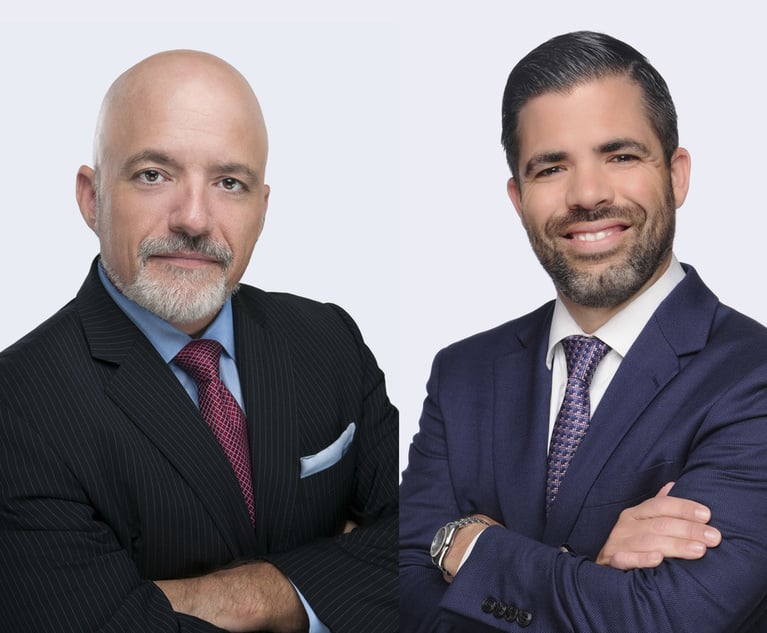Maternity Leave, Lactation Rooms and Firm Culture — Keys to Law Firm Diversity
I am not sure that employers fully grasp the nature of the decision to provide paid maternity leave. I have spoken with many friends who have taken this factor into account when deciding where to seek employment.
March 08, 2019 at 09:03 AM
7 minute read
 Jennifer Feld, Kubicki Draper, Tampa
Jennifer Feld, Kubicki Draper, Tampa
I am not sure that employers fully grasp the nature of the decision to provide paid maternity leave. I have spoken with many friends who have taken this factor into account when deciding where to seek employment. I have conducted mock interviews with colleagues, who in trepidation are preparing to approach a managing partner about negotiating maternity leave into their employment contract. There are attorneys who are planning their child rearing around when they might make partner, and whether or not the decision to have a child will hold them back from that goal. Other peers wish to make a lateral move and are willing to take salary decreases in exchange for maternity leave benefits and work-from-home accommodations.
I experienced firsthand the difficulties of being both a new mother and a trial attorney. I was first faced with the challenge of feeding my child while aggressively trying a case. My first five-day jury trial was four weeks after I returned from maternity leave. I wrote an article for the Daily Business Review titled “A New Mother's Guide to Pumping During a Jury Trial,” which was later picked up by the Florida Bar, the American Bar Association, and Above the Law. The article is a practical guide to the procedure, motion practice and jury instructions required for pumping during a jury trial. I drafted a form motion for trial accommodations, jury instructions to excuse attorneys from the courtroom during trial, and amendments to the order of witnesses. I then co-authored an article for the Paraclete, titled “Lactation Rooms: The Personal and Professional Pursuit of Equality for Women in the Legal Profession.” The article included my personal testimony and experience as a new mother and attorney without access to a lactation room. This resulted in some news coverage, and even a courthouse ribbon cutting.
- Somehow, despite the number of women currently enrolled in U.S. law schools, I often find myself as the only female attorney in the courtroom during trial calendar call.
Where are these other women? Are they dropping out of the profession because of the difficulties of balancing work and family? Are they choosing a path other than litigation because it is proving to be too difficult to be an aggressive trial lawyer and a dedicated mother, wife, daughter? How can we make it better? How can we increase the number of female equity partners nationwide? Only 18 percent is unacceptable.
I remember when I was first applying for jobs a decade ago. I had received two offers—both from litigation firms. One was a male-dominated boutique firm with a strong reputation and a general litigation practice. The other offer was from a large firm, also with an excellent reputation, which specialized primarily in insurance defense. I remember discussing my options with my mother, suggesting the smaller firm may give me a broader view of different areas of law, because they practiced everything from family law to commercial litigation. Her response was this: “Look at the website for this firm. Look at all the female partners! This is clearly a place where women can succeed.” My mother, a product of the 1970s feminist movement, was ingrained to think this way. She thought simply attending law school was a privilege in and of itself, one which I took for granted. Of course, she was right. Even a decade ago, 50 percent of the firm's executive board was female, and before diversity was en vogue, the firm was as diverse as they come. I was promoted to shareholder quickly and without hesitation, offered maternity leave, pumping accommodations and even congratulations following my son's birth. I understand that I am privileged in this regard.
I am a co-chair of the firm's summer associate program. The question I receive most often is what kept me at the firm? One of the factors I always mention is firm culture. The firm has an open-door policy. Many of the attorneys are friends with each other on a personal level and enjoy each other's company. This culture is backed by a promise to the attorneys that they will be treated as professionals. They are not judged by “face time” or by how many hours they are physically in the office on a given day. Rather, there is an expectation that the work will be done, and it will be done well. As a professional, everyone is responsible for his or her own reputation, both in the workplace and in the legal field.
What does this mean for a female attorney specifically? It means I can be at my son's doctor's appointment. It means my colleagues will ask me about the well-being of my child. It means I can make a two-hour dentist appointment when necessary, and accommodate my own schedule to allow for it. On the rare occasion when my nanny has the flu, I can work from home and not have to worry about certain repercussions, such as using vacation days or paid time off. As a professional with a heavily active caseload, if I take time away from work, I am expected to make up that time or another day. But it means I won't miss out on the important things. It means I will be able to balance work and family, which is priceless.
It makes coming to work every day a little bit easier when my son is crying for me not to leave. It helps me close the book when he is begging me for just one more story during our morning reading time. I am not going to say it is easy. It is still a delicate balance. As I looked around my office, which is just one regional office of many, I could see four female attorneys with children under the age of 6. Two of my colleagues were pumping at the office. This is no coincidence. Clearly we were all here for the same reason.
- Why is this elusive “firm culture” so important?
Because a parental leave policy is useless if the employees are afraid to use it. A firm culture that is supportive of its attorneys in their personal lives in turn creates an attorney who is supportive of the firm. This attorney will be committed to the firm's success and will be proud to work there.
The alternative is a pride that is financial, or based in name only. This is the kind of pride that comes with the firms that require face time, an internal file management system that notes when attorneys are “logged in,” “idle” or “logged out,” and high billable rates. A name-pride only lasts for a few years, until the attorney realizes what's really important in life or has an early midlife crisis and runs off to California to be a surfer. Either way, it's not an approach that fosters long-term investment.
Employers, take note. Hopefully, you want to attract and retain strong talent. Maybe you simply want to improve your diversity statistics with your clients. I implore you to look no further than your maternity leave policy. Look at your firm culture. Perhaps consider a lactation room as well. Trust me; female attorneys will get the message. You will not need to find them—they will find you.
Jennifer Feld is a shareholder at Kubicki Draper in Tampa.
This content has been archived. It is available through our partners, LexisNexis® and Bloomberg Law.
To view this content, please continue to their sites.
Not a Lexis Subscriber?
Subscribe Now
Not a Bloomberg Law Subscriber?
Subscribe Now
NOT FOR REPRINT
© 2025 ALM Global, LLC, All Rights Reserved. Request academic re-use from www.copyright.com. All other uses, submit a request to [email protected]. For more information visit Asset & Logo Licensing.
You Might Like
View All



Don’t Forget the Owner’s Manual: A Guide to Proving Liability Through Manufacturers’ Warnings and Instructions
5 minute readTrending Stories
- 1Judge Sides With Retail Display Company in Patent Dispute Against Campbell Soup, Grocery Stores
- 2Is It Time for Large UK Law Firms to Begin Taking Private Equity Investment?
- 3Federal Judge Pauses Trump Funding Freeze as Democratic AGs Launch Defensive Measure
- 4Class Action Litigator Tapped to Lead Shook, Hardy & Bacon's Houston Office
- 5Arizona Supreme Court Presses Pause on KPMG's Bid to Deliver Legal Services
Who Got The Work
J. Brugh Lower of Gibbons has entered an appearance for industrial equipment supplier Devco Corporation in a pending trademark infringement lawsuit. The suit, accusing the defendant of selling knock-off Graco products, was filed Dec. 18 in New Jersey District Court by Rivkin Radler on behalf of Graco Inc. and Graco Minnesota. The case, assigned to U.S. District Judge Zahid N. Quraishi, is 3:24-cv-11294, Graco Inc. et al v. Devco Corporation.
Who Got The Work
Rebecca Maller-Stein and Kent A. Yalowitz of Arnold & Porter Kaye Scholer have entered their appearances for Hanaco Venture Capital and its executives, Lior Prosor and David Frankel, in a pending securities lawsuit. The action, filed on Dec. 24 in New York Southern District Court by Zell, Aron & Co. on behalf of Goldeneye Advisors, accuses the defendants of negligently and fraudulently managing the plaintiff's $1 million investment. The case, assigned to U.S. District Judge Vernon S. Broderick, is 1:24-cv-09918, Goldeneye Advisors, LLC v. Hanaco Venture Capital, Ltd. et al.
Who Got The Work
Attorneys from A&O Shearman has stepped in as defense counsel for Toronto-Dominion Bank and other defendants in a pending securities class action. The suit, filed Dec. 11 in New York Southern District Court by Bleichmar Fonti & Auld, accuses the defendants of concealing the bank's 'pervasive' deficiencies in regards to its compliance with the Bank Secrecy Act and the quality of its anti-money laundering controls. The case, assigned to U.S. District Judge Arun Subramanian, is 1:24-cv-09445, Gonzalez v. The Toronto-Dominion Bank et al.
Who Got The Work
Crown Castle International, a Pennsylvania company providing shared communications infrastructure, has turned to Luke D. Wolf of Gordon Rees Scully Mansukhani to fend off a pending breach-of-contract lawsuit. The court action, filed Nov. 25 in Michigan Eastern District Court by Hooper Hathaway PC on behalf of The Town Residences LLC, accuses Crown Castle of failing to transfer approximately $30,000 in utility payments from T-Mobile in breach of a roof-top lease and assignment agreement. The case, assigned to U.S. District Judge Susan K. Declercq, is 2:24-cv-13131, The Town Residences LLC v. T-Mobile US, Inc. et al.
Who Got The Work
Wilfred P. Coronato and Daniel M. Schwartz of McCarter & English have stepped in as defense counsel to Electrolux Home Products Inc. in a pending product liability lawsuit. The court action, filed Nov. 26 in New York Eastern District Court by Poulos Lopiccolo PC and Nagel Rice LLP on behalf of David Stern, alleges that the defendant's refrigerators’ drawers and shelving repeatedly break and fall apart within months after purchase. The case, assigned to U.S. District Judge Joan M. Azrack, is 2:24-cv-08204, Stern v. Electrolux Home Products, Inc.
Featured Firms
Law Offices of Gary Martin Hays & Associates, P.C.
(470) 294-1674
Law Offices of Mark E. Salomone
(857) 444-6468
Smith & Hassler
(713) 739-1250






